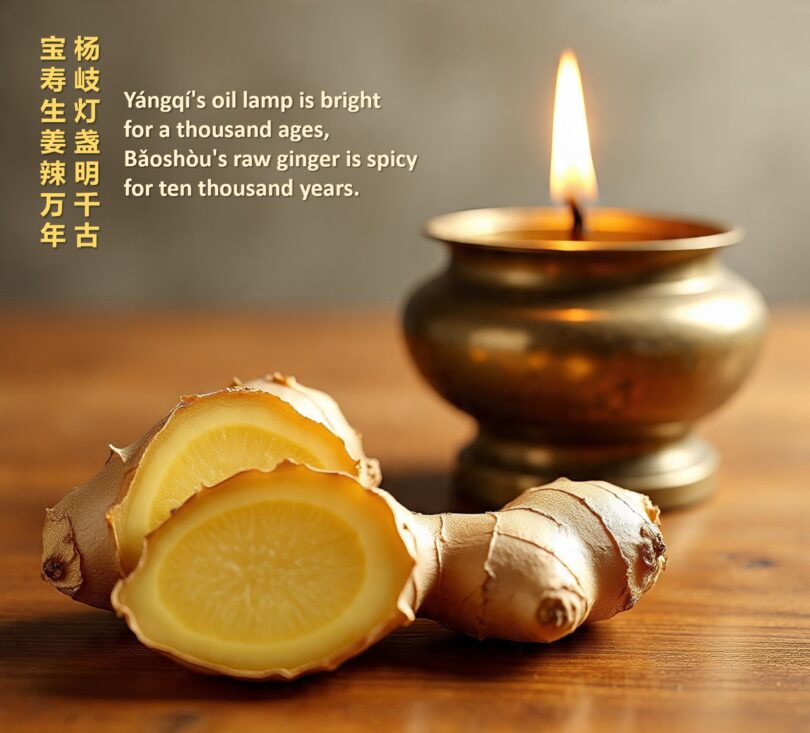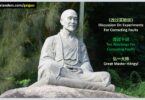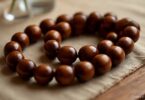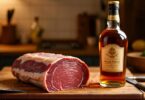为何「杨岐灯久明,宝寿姜仍辣」
Why ‘Yángqí’s Lamp Remains Bright [And] Bǎoshòu’s Ginger Stays Spicy’
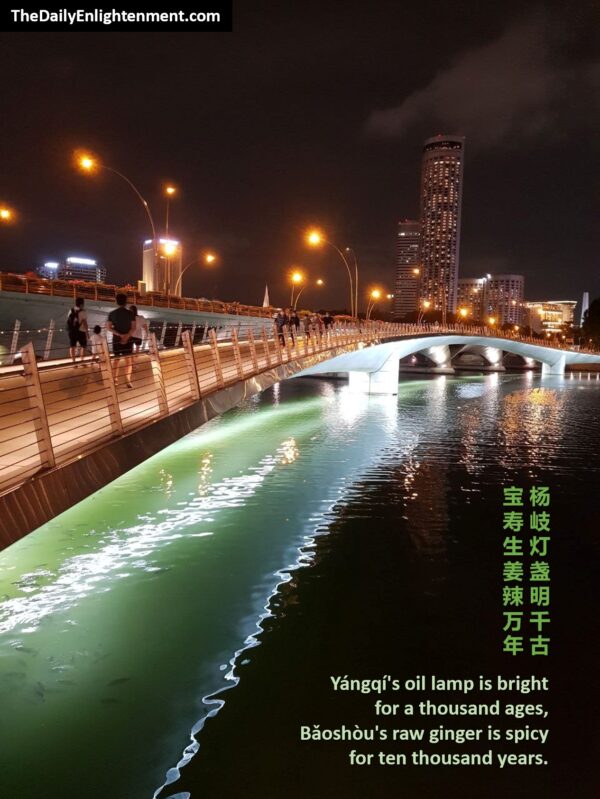
光初出家,见「杨岐灯盏明千古,宝寿生姜辣万年」之对,并沙弥律,言盗用常住财物之报,心什凛凛。
[When Yìn]guāng [印光] first left [the] house[hold life], seeing [the] couplet of ‘Yángqí’s oil lamp [is] bright [for a] thousand ages, Bǎoshòu’s raw ginger [is] spicy [for] ten thousand years’, and [the] Sāmaṇera Vinaya’s [i.e. novice monastic disciplinary rules] words, [which] speak [on the] retribution of stealing [and] using permanent residents’ [i.e. those who stay in monasteries] wealth [and] properties, [my] mind [was with] extreme seriousness.
[Note 1: To misuse, abuse, waste and steal Buddhist temples and centres’ resources, including utilities such as water and electricity, is not only to steal from the permanent residents, who include monastics, staff and volunteers, it is also to steal from the public donors, who sponsored and/or are sponsoring those resources for proper usage as intended. This is called stealing from the ten directions’ sentient beings (十方众生). Thus, the evil karmas (恶业) created are extremely heavy and difficult to calculate, with equally inconceivable retribution to come, unless there is repentance practised and remedial actions done in time.]
凡整理糖食,手有粘及气味者,均不敢用口舌餂食,但以纸揩而已。
[I] always [then, when] tidying up sweet foods [i.e. as the monastery’s storekeeper (库头)], [with] hands having them sticking and [with their] smells, [with] all, [did] not dare [to] use [my] mouth’s tongue [to] lick [and] eat [them]. Only using paper [to] wipe [them off], that is all.
[Note 2: To eat even a grain of sugar meant for the monastery is also to steal it from all in the monastery and its donors.]
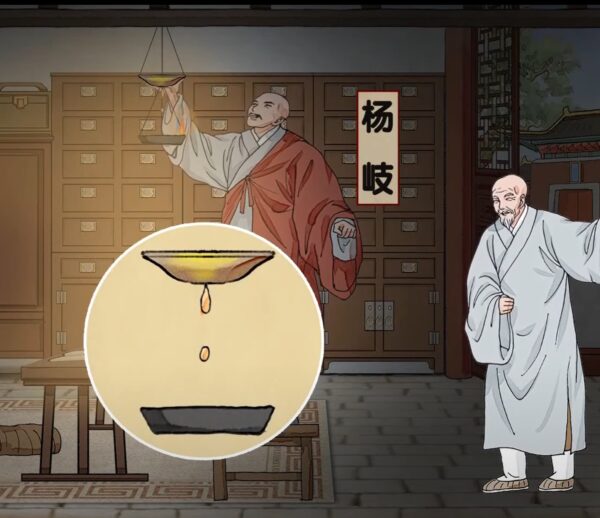
「杨岐灯盏」者,杨岐方会禅师,在石霜圆会下作监院,夜间看经,自己另买油,不将常住油私用。
That ‘Yángqí’s oil lamp’, [is] Chán Master Yángqí Fānghuì, [who] was under [Chán Master] Shíshuāng Yuánhuì [995-1049], serving [as the] monastery supervisor. [When in] nighttime reading sūtras, [he] personally [used] separately bought oil, not using permanent residents’ oil [for] private usage.
[Note 3: Chán Master Yángqí Fānghuì (杨岐方会禅师) used two lamps stacked on one another. The one above was for doing tasks for the monastery’s permanent residents, while the one below was for his personal sūtra-reading, with the latter’s oil self-bought, so as to not use that from the permanent residents for his own matters.
However, the oil above might drip to the below. When Chán Master Shíshuāng (石霜禅师) saw the lamps, he raised his voice and said, ‘Oh! Wrong, wrong! Your lamp should be placed on top!’ She explained, ‘When you place the permanent residents’ lamp above and light it, the oil will drip down into your lamp. Can you bear the effects of encroaching upon and diminishing that of permanent residents?’
Upon hearing this, the Master quickly swapped the lamps’ positions. Thereafter, when he lit his personal lamp, its oil would drip into the permanent residents’ lamp instead. Not only does this prevent creating of evil karmas, it creates good karmas by practising generosity too. This incident is the origin of the first half of the couplet above, with the lasting brightness of the personal lamp representing Chán Master Yángqí’s timeless good example’s eternal relevance.]
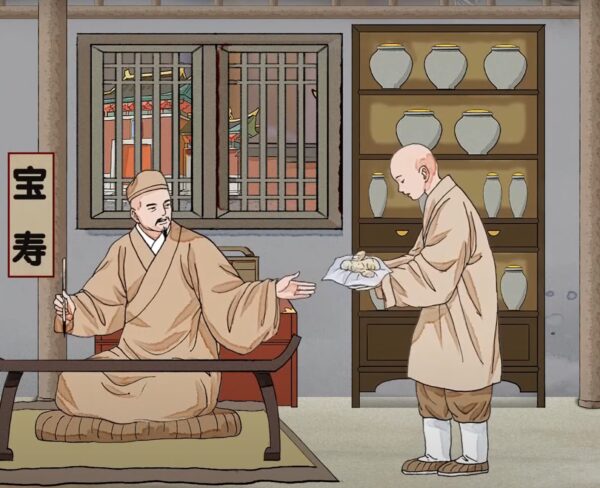
「宝寿生姜」者,洞山自宝禅师,(宝寿乃其别号)在五祖师戒禅师会下作监院,五祖戒有寒病,当用生姜红糖熬膏,以备常服。
That ‘Bǎoshòu’s raw ginger’, [is] Chán Master Dòngshān Zìbǎo [978-1054], (Bǎoshòu [is] thus his other name [i.e. alias]), [who] was under Wǔzǔ [Monastery’s] [五祖寺] Chán Master Shījiè’s assembly, serving [as the] monastery supervisor. [When Master] Wǔzǔ [Shī]jiè had sickness [with a] cold, [there] should [be] use [of] raw ginger [and] brown sugar, simmered [to a] paste, with [this] prepared [to be] taken frequently.
[Note 4: Due to spiritual backsliding (retrogression) (退转) from not practising to reach Āmítuófó’s (阿弥陀佛) Pure Land (净土), in Wǔzǔ Monastery’s Chán Master Shījiè’s (五祖寺师戒禅师) future life, he was reborn to become the poet, essayist, calligrapher, painter, scholar-official, literatus, artist, pharmacologist and non-vegan gastronome Sū Dōngpō (苏东坡): https://purelanders.com/2021/12/28/2-chan-master-jie-in-his-later-life-becoming-dongpo.]
侍者往库房求此二物,监院曰:「常住公物,何可私用?拿钱来买。」戒禅师即令持钱去买,且深契其人。
[When] his attendant went [to the] storeroom [to] seek these two things, [the] temple supervisor said, ‘[As these are the] permanent residents’ public things, how can [they be] privately used? Bring money [to] come [and] buy them.’ Chán Master Shī[jiè] immediately ordered [his] attendant [to] hold money [to] go [and] buy [them], moreover deeply agreeing [with] that person.
[Note 5: When the attendant reported to Chán Master Shījiè (师戒禅师) on Chán Master Bǎoshòu’s (宝寿禅师) question and request, Master Shījiè took out his own money to pass it to his attendant to go buy the ingredients. This incident is the origin of the second half of the couplet above, with the lasting spiciness of the ginger representing Master Bǎoshòu’s timeless good example’s eternal relevance.]
后洞山住持缺人,有求戒禅师举所知者,戒云卖生姜汉可以。
Later, [when] Dòngshān [Monastery’s] [洞山寺] Abbot [was] lacking [a] person [for the position], having those seeking Chán Master Shī[jiè to] recommend those known, [Master Shī]jiè said [that the] man [who] sold raw ginger [is] capable.
[Note 6: Thus, when Great Master Yìnguāng (印光大师) was still a novice monk, he already took Chán Master Yángqí and Chán Master Bǎoshòu to be his role models for fulfilling his responsibilities, with strictness of morality and meticulous mindfulness of karmic cause and effect, in managing all monastery matters and those beyond.]
净土宗十三祖印光大师
Pure Land Tradition’s 13th Patriarch Great Master Yìnguāng
《复邵慧圆居士书一》
First Reply Letter [To] Layperson Shào Huìyuán
Namo Amituofo : Translation and notes by Shen Shi’an

